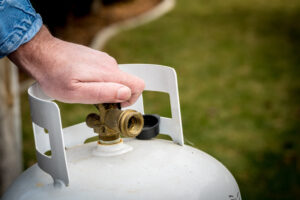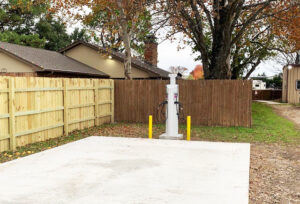RV Inspections After Severe Weather
February 21, 2021
Here at Waggin’ Tail Ranch RV Park, we try to share tips and advice to serve full-time RVers and weekend warriors alike. However, today our contribution is a reflection of a somber reality. After the February 2021 Winter Storm, Texans are rebuilding both their RVs and brick-and-mortar homes.
The word “unprecedented” is being used far too frequently for comfort lately. Many parts of Texas saw snowfalls and winter conditions this February the likes of which hadn’t been recorded in at least 30 years. Millions were without power as grid operators turned off the power in an effort to prevent a full overload of the system and the possibility of months worth of blackouts. Roadways were impassable, grocery stores empty of food. A state of emergency was declared by both the state and the federal government.
The winter storms in Texas this month were just one more unprecedented tragedy in the past year or so. As Inigo Montoya from The Princess Bride said when Vizzini kept shouting ‘inconceivable!’– “I don’t think that means what you think it means.”
But in unprecedented times, you must have unprecedented preparation.
In order to assist you in your preparation, here’s a basic guide to surviving the severe cold in an RV.
This post will cover a few things:
- What to do for your RV after a winter storm
- What to do to prepare your RV for a winter storm
- What to do to prepare yourself for a winter storm
1.) What to do for your RV after a winter storm
Freezing temperatures for an extended time cause water to freeze and swell. Pipes and tanks crack and burst. Even winterizing your RV is not a guarantee that nothing will be damaged. It’s a good idea to assume that damage has been done somewhere and seek those damages out when the weather allows.
The following list is courtesy of Mark Polk of RV 101. Mark and his wife Dawn started RV Education 101, a video and RV information company in 1999.
Things to check:
- RV antifreeze concentration levels
- Batteries: Before attempting to restart your RV after a freeze, let the battery completely thaw before using. Then visually inspect the battery. Any swelling or cracks in the casing is bad news. You should not try to use that battery. If there is damage, it’s best to take itto a professional for an inspection. Mark Polk has a deep dive guide into how to manage this process on your own.
- Automotive antifreeze concentration levels
- RV seams and sealants
- LP gas system
- Electronics
- Snow removal
- RV tires
- RV plumbing system:
- Plumbing lines and fittings
- RV water heater tank
- City water inlet
- Ice maker, washing machine and dishwasher plumbing
- Holding tanks
- Flush valve in the toilet
- Outside shower
To identify potential leaks in your water system (but not the location) add a few gallons of potable water to the freshwater holding tank. Close all faucets and any other plumbing components. Activate the water pump and pressurize the system. The pump should shut off once it reaches optimal pressure. However, if there is a leak, it will just keep running. If that’s the case, shut it down and start looking for that leak (or those leaks).
If you identify something that is beyond your capabilities to fix, contact a professional RV inspector. Having a working rig is worth the investment.
2.) What to do to prepare your RV for a winter storm
Some RVs come with what’s called an arctic package. This means the manufacturer prepared the RV better for cold weather than an RV without the arctic package. However, even with an arctic package, the cold can damage your RV and be less than comfortable in frigid temperatures.
When water freezes, it expands– hence all those photos of burst pipes from across the state. The same thing can happen in your RV, especially since a lot of the piping and holding tanks are not in the heated interior of the RV.
Heat taping the pipes on your RV can help keep those essential pipes from freezing solid. Heat tape is great for the water hose and the sewer pipe. For more information on heat taping your RV, see our article here.
For the tanks, get yourself a holding tank heater pad like this one. An RV skirt will also help retain heat around the tanks, as this creates a layer of insulation to protect the underside of your RV (and with it the batteries and tanks).
Windows are the main places where heat escapes, so make sure to reinforce those with foam insulation boards, bubble wrap insulation, solar blankets, thermal curtains or Reflectix.
Check the sealant on your doors and windows and reseal where needed because of cracking or damage. A heated RV water hose like this one can help prevent freezing and damage. Keep RV antifreeze handy so you can pour it down the sink drain, shower drain, and toilet when temperatures drop. Make sure you have plenty of propane so you won’t run out before temperatures recover. Low wattage space heaters can help supplement the built-in heaters.
Finally, make sure you have a plan for minimizing humidity. All that heat inside what is essentially a box is a recipe for humidity, condensation, and eventually mold. Dehumidifying pellets and electric dehumidifiers can help.
Keep in mind, DIY RV insulation takes time, so make any modifications while the weather is good.
3.) What to do to prepare yourself for a winter storm
Although so much of what we have experienced in 2020 and 2021 is unprecedented, now that you know what can happen, you must not let the next big storm, whether it is in Texas or any other state during your travels, catch you unprepared.
Although most of those with RVs in Texas benefit from having a generator, frozen pipes, lack of electricity, dwindling potable water, and food scarcity still hit hard. Preparing what you need to get through a winter storm with or without your RV is paramount.
- Have an emergency bag: You may need to go to a warm-up center or shelter if conditions get too crazy, so have what you will need for a few days in a go-bag. Don’t forget medications for humans and pets, water, pet food and paperwork.
- Know where to go if the weather gets too bad: Whether it’s a place to find a meal and warm up for the afternoon or a shelter to stay in for days, know where to go if it gets too rough in the RV.
- Replenish emergency food and water. Make sure expiration dates are still good and that there is more than you think you will need.
- Battery-powered weather radio
- Phone charger and power bank. You can find solar-powered power banks like this one, or power banks with huge capacity like this one.
- Headlamps, flashlights, and extra batteries. When you are without power for a week, you’d be surprised by how quickly you’ll go through batteries.
- First aid kit
- Know the RV park address and site number: If you have to call 911, you’ll be able to tell them where to find you.
Make sure your insurance is adequate. This is an excellent tip from Take That Exit. If your RV is your full-time home, make sure your insurance will cover you if this rig doesn’t make it.
In summary, preparation is everything, whether you are preparing for a weekend trip to the seaside or a year-long tour of America. RVing in winter storms is not impossible with the right preparation and supplies. We hope this blog post helps and that it finds you well, safe, and warm.




